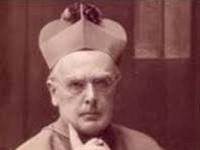Msgr. Vaughan—Outside The Church No Salvation

Monsignor Vaughan recently treated this subject before the Liverpool Branch of the English Truth Society. He sums up the teaching of the Church on the subject in the following four propositions:
-
“Whether it be a man’s own personal fault or not, it was still true to say there was no greater misfortune than to be living outside the pale of the Catholic Church.
-
A man who deliberately remained outside the pale of the Catholic Church through his own fault, such as through wilful ignorance and gross neglect or indifference, will most certainly be lost should he continue in that state to the end.
-
A man who was out of the visible unity of the Catholic Church through invincible ignorance, and through no fault of his own, would be excused from the formal guilt of heresy, so that, though he might be condemned for other offences, that sin, at all events, would not be laid to his charge.
-
Though they asserted that without any doubt the Protestants may be saved, and though they were quite ready to allow even that a great many actually were saved, owing to their invincible ignorance, yet there was one thing of which they were still more certain, and that was that, though a Protestant might be saved, it would not be by means of his Protestantism, but in spite of it. Protestantism as such has no saving power. Though it might be a strange thing to say, it was nevertheless true that a Protestant who was saved was saved not in so far as he was a Protestant, but simply in so far as he was a Catholic, and had been influenced by the doctrines which Protestants had received from the true Church. The genuine and distinctive Protestant doctrines, that is, the doctrines that were exclusively Protestant, could save nobody. On the contrary, they could but hinder and impede salvation."
Canon Vaughan’s way of putting the Catholic doctrine, which means that a man is bound to seek and accept God’s revelation precisely in the form in which He has proposed it, and that this revelation is found completely and perfectly in the Roman Catholic Church, has the special merit or stirring up persons who delude themselves with the Branch theory of the Anglican communion. Protestants as such are pledged to doctrines which imply an actual protest against the Church; and Anglicans who refuse to accept the Roman jurisdiction, whatever other acknowledgement they accord the Church of Rome, do practically protest against a revelation which cannot be said to lie beyond the ordinary reach of understanding. To many even of those who live in the midst of nominally Catholic society, the Catholic doctrine, owing to the un-Catholic lives of baptized Catholics, may have a semblance of error so strong that it cannot remove their prejudices and thus they remain practically in invincible ignorance. The limitations of this invincible ignorance is, to our thinking, the real difficulty of the whole question. Father Pope’s paper in this issue deals with this main aspect, although his purpose is apparently apologetic. It comes to this: God has given us truth; He has given us a command, together with a mind to apprehend and a will to the fullest extent to accomplish this command. If we fail to do this, we incur the loss, through our own fault. That loss is irreparable.